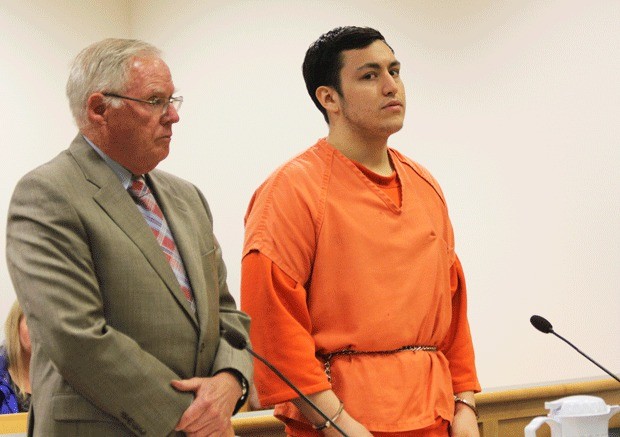The word “senseless” was repeated over and over again in Island County Superior Court Wednesday morning.
David Nunez, a 20-year-old Oak Harbor High School graduate, admitted in court that he conspired with three friends to murder another one of their friends and provided the gun that killed the teenage boy last November.
The motive for the murder was a $400 impound fee.
Judge Vickie Churchill noted that the pointless murder was similar to another recent case in which a young man was killed over a petty dispute. She hoped that the outcome and senseless pain of the tragedies would resonate with other young people in the community.
“There is no honor here,” she said. “There is no street credit. All there is is shame.”
As part of a plea bargain, Nunez pleaded guilty to conspiracy to commit murder in the first degree with a firearms enhancement.
The prosecution and defense agreed to recommend a sentence of 25 years in prison, which is the top of the standard sentencing range. Churchill imposed the sentence.
Nunez was the second of four codefendants in the murder of 17-year-old John “Jay” Johnson to agree to a plea bargain in the case. In February, Brian Rayford, 20, pleaded guilty to first-degree murder and agreed to testify against his codefendants; Nunez did not agree to testify.
Kitana Hernandez, 19, and Derek Reeder, 16, are also facing murder charges.
The shooting occurred on the night of Nov. 10, 2015.
According to police reports, Nunez was upset that Johnson borrowed his car and caused it to be impounded by the Washington State Patrol. He asked his friends to help him carry out a hit against Johnson and furnished Rayford — the shooter — with the gun.
A report by Detective Ed Wallace with the Island County Sheriff’s Office indicates that Hernandez drove Rayford, Reeder and Nunez to Johnson’s house on North Whidbey.
Rayford and Reeder walked up to the house together.
After speaking with Johnson briefly at the front door, Rayford pulled a .22-caliber handgun “out of the pocket of his hoodie, pointed the gun at Johnson, closed his eyes, turned his head and pulled the trigger,” Wallace wrote.
Johnson was struck in the head and died several days later at Harborview Medical Center in Seattle.
In court, Nunez spoke briefly, apologizing to the community and Johnson’s family.
“I want to apologize to my family,” he added, “for letting them down and not being the best person I can be.”
Chief Criminal Prosecutor Eric Ohme said Nunez hatched the conspiracy to kill Johnson. He accused Nunez of having “unfathomable narcissism.”
“But for Mr. Nunez’s bruised ego, Jay Johnson would still be alive today,” he said.
Detective Wallace read several “survivors’ impact statements” written by Johnson’s family and friends; in addition, a couple of his friends spoke. Just about everyone asked that Nunez receive the maximum sentence; many noted that the murder was a tragedy for the families of the accused also.
Johnson was raised by his grandmother, Shari Mattson Cooper. She wrote that she believes Nunez instigated the murder and convinced the others to get involved.
“Saddest of all, my grandson believed Mr. Nunez was his friend along with the others,” she wrote.
Yet she holds no hatred for the young man.
“I do have one wish,” she wrote, “and that is for Mr. Nunez to serve his time, forgive, and find peace within himself.”
Angelique Williams wrote that she is depressed and having a hard time because she was friends with everyone involved in the case.
“I don’t understand how you can have the mentality to do this to someone you call a friend,” she wrote.
Johnson’s uncle, Ryan Mattson, wrote that everyone involved in the crime was equally guilty and knew what they were doing, though they may not have understood the ramifications.
“I hope you spend the sentenced time you receive thinking about the beautiful life you took from this world,” he wrote. “I hope it eats you up and you become consumed by it, because nothing will settle this.”
Churchill wondered aloud what Nunez was thinking while hearing the statements, noting that he remained “stoic” in court. She noted the case’s similarities with the recent trial of Christopher Malaga, who was convicted of murdering his friend, Adam Garcia, over perceived slight in October of 2014. He was sentenced Friday afternoon.
“It has something to do with this pride and bruised ego,” she said, “but also a sense of entitlement to take someone’s life because something just didn’t go your way.”



